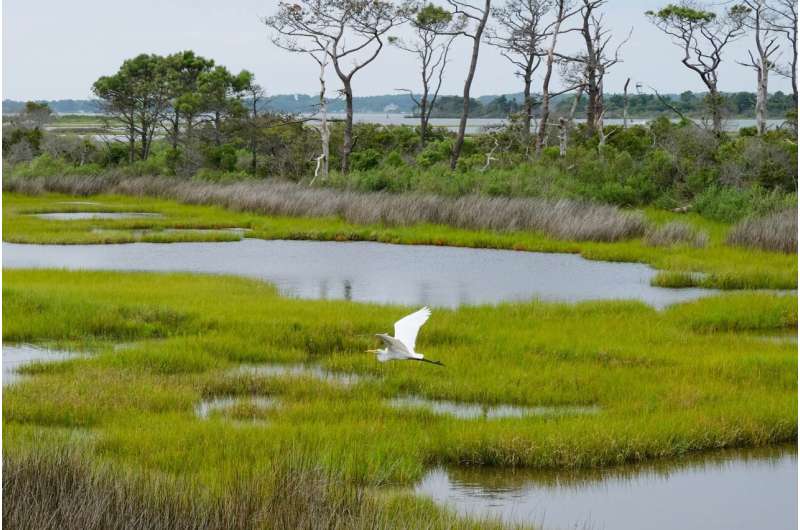This article has been reviewed according to Science X's editorial process and policies. Editors have highlighted the following attributes while ensuring the content's credibility:
fact-checked
reputable news agency
proofread
Indiana wetlands bill garners praise, criticism as it heads to governor's desk

Supporters of wetland legislation approved 6 Feb. by the Indiana legislature say the regulations are fair to residents, property owners, agriculture and developers while those against it say the state has already weakened wetland protections and this will only serve to damage sensitive ecosystems, increase flooding and decrease water quality.
Now it will be up to Indiana Gov. Eric Holcomb whether he will sign the controversial bill into law.
The legislation was introduced by GOP state Sen. Rick Neimeyer, who said it pertains to state wetlands only, not federal. It takes some of the classifications and changes those that do not meet the definition of isolated wetlands.
He said IDEM and the Indiana Department of Natural Resources will be responsible for reviewing and deciding whether a specific wetland can be declassified. The process will be transparent and the agencies will have to explain their decisions.
Niemeyer said the legislation is necessary because classifying some of these "wet holes" that do not meet the definition of isolated wetlands is unfair to property owners.
Living in south Lake County he has always had a concern about flooding but does not believe the legislation will have that big of an effect on flooding. Still, he said, like others he will be watching what happens if the measure becomes law.
Niemeyer said with his experience on the Lake County Plan Commission and drainage board, he worked with the bill and thinks it is where it needs to be to be fair to all parties.
"I understand the issues on both sides," Niemeyer said.
State Sen. Dan Dernulc was among a group of eight Republicans to break rank and vote against the measure when it came before the Senate.
"I personally do not like the changes to the classes," Dernulc said.
He describes himself as "a bit of an environmentalist" and would prefer to keep things the way they are. Dernulc said his is still for development.
"We have to do it with the way the good Lord made it," Dernulc said.
Organizations like Audubon Great Lakes are urging Holcomb to veto the legislation.
"Two years ago, lawmakers rolled back protections for more than half of Indiana's wetlands. Yesterday, the Indiana Legislature passed a bill that could leave more vital wetlands out to dry.
Despite its fast track through the legislature, HB 1383 has faced growing opposition from Hoosiers and conservation groups. Yesterday's Senate vote demonstrated a lack of consensus among lawmakers. Governor Holcomb can protect Indiana's natural resources by vetoing this problematic bill," the statement read.
Meanwhile, organizations like the Indiana Builders Association have come out in support.
"We support clearly defined isolated wetlands classifications to provide regulatory relief for property owners and developers while ensuring protection of high-quality isolated wetlands," according to the IBA website.
"In 2021, the Indiana General Assembly enacted legislation that protects high-quality isolated wetlands while reducing the regulatory costs and permitting requirements on low-quality Class I isolated wetlands in Indiana," it continued.
"In the years since the law was passed, property owners and environmental consultants who conduct wetland delineations have found that the State Regulated Wetland Class Determination Worksheet utilized by the Indiana Dept. of Environmental Management (IDEM) presented some implementation challenges as it related to the intent of SEA 389 and the classification of isolated wetlands in the state," the statement read.
Lake County Surveyor Bill Emerson Jr. said losing any wetlands will increase flooding and decrease water quality.
"I view wetlands as a public resource just like our other waterways that need to be protected. I'm hoping our governor feels the same way," Emerson said. Emerson was among those opposed to the legislation who spoke out against it in 2023.
"Changing those classifications means that more ecologically important wetlands will be categorized in a way they will not be protected," Emerson said.
He said the state already has reduced protections for wetlands quite a bit.
"Once they are gone, they're gone. They are expensive to recreate," Emerson said.
Niemeyer said the legislation also contemplates recreating some wetlands lost to development through a credit system. Developers will pay credits to fill a wetland that can be used to create other wetlands or increase an existing wetland.
"It's a two-way street. Everybody needs to be working together," Niemeyer said.
2024 Chicago Tribune. Distributed by Tribune Content Agency, LLC.



















